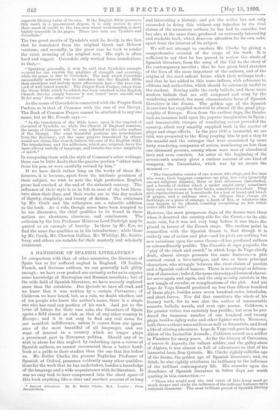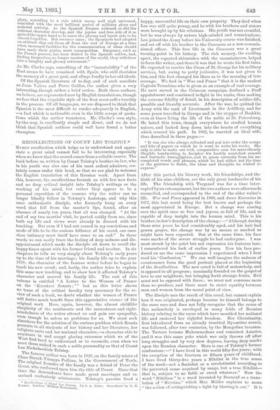A HANDBOOK OF SPANISH LITERATURE.* IN comparison with that of
other countries, the literature of Spain has so far suffered neglect in England. Of Italian, French, and German authors, we can generally talk glibly -enough ; we have even pushed our curiosity so far as to acquire some knowledge of Norwegian and Russian novelists ; but of the wide field of Spanish literature, we have scarcely explored more than the outskirts. Don Quixote we have all read, and we know that it was written by a certain Cervantes ; of Calderon we have heard, but, as a rule, we doubt whether, out of ten people who know the author's name, there is a single one who has read any portion of his work. And yet to the lover of letters for their own sake, the literature of Spain opens a field almost as rich as that of any other country in Europe ; and it is not easy to find any real cause for our manifest indifference, unless it comes from our ignor- ance of the most beautiful of all languages, and our want of interest in a country which no longer plays a prominent part in European politics. Should any of us wish to atone for this neglect by embarking upon a course of Spanish authors, we cannot recommend them a better hand- book as a guide to their studies than the one that lies before us. Mr. Butler Clarke, the present Taylorian Professor of Spanish at Oxford, possesses evidently many other qualifica- tions for the work that he has undertaken, besides a knowledge of the language and a wide acquaintance with its literature. It was no easy task to have compressed into the short space of this book anything like a clear and succinct account of so long • Spanish Literature. By H. Butler Clarke, DLL, London Swan Sounensoboin, and interesting a history; and yet the writer has not only succeeded in doing this without any injustice to the rival claims of the numerous authors he has had to consider, but has also, at the same time, produced an extremely interesting and readable book, which deserves attention for its own sake, apart from the interest of its subject.
We will not attempt to emulate Mr. Clarke by giving a comprehensive account of the scope of his work. It is sufficient to say that he has passed in review the whole of Spanish literature, from the song of the Cid to the story of the contemporary novelist; that he has given brief sketches of the lives of the more important of the authors, and of the origins of the most salient forms which their writings took ; and that he has added to this some indices, with reference to editions and authorities, which should be extremely useful to the student. Setting aside the early ballads, and those more modern ballads that are still composed and sung by the wandering minstrel, the most characteristic form of Spanish literature is the drama. The golden age of the Spanish dramatists has supplied material to almost all the great play- wrights of Europe. Even from the earliest days, the theatre took an immense hold upon the popular imagination in Spain ; and innumerable troupes of wandering actors pervaded the country, albeit very scantily supplied both in the matter of plays and stage-effects. In the year 1645 a memorial, we are told, was presented to the King praying him to put a stop to the scandal and the outrages that were occasioned by some forty wandering companies of actors, numbering no less than one thousand persons, among whom were men of abandoned lives and even convicts. An actor at the beginning of the seventeenth century gives a curious account of one kind of company, the Carambales, which was by no means the meanest :- " The Carambales consist of one woman who sings, and five men who weep; their baggage comprises one play, two autos (generally one-act religious dramas), three or four ontremeses (interludes), and a bundle of clothes which a spider might carry; sometimes they carry the woman on their backs, sometimes in a chair. They give representations at homesteads for a loaf of bread and bunch of grapes, and a cabbage stew ; in villages they charge six farthings, or a piece of sausage, a shank of flax, or whatever else may happen to be offered, counting everything as fish which comes into their net."
However, the most prosperous days of the drama were those when it deserted the country-side for the Court,—to its ulti- mate ruin, for it was not very long before it was there die. placed in favour of the French stage. The curious point in connection with the Spanish drama is, that though it is entirely one of action and plot—and its plots are nothing but new variations upon the same theme—it has produced authors so extraordinarily prolific. The Comedia de capa y espada, the "play of the cloak and sword," in which Lope de Vega chiefly dealt, almost always presents the same features,—a plot centred round a love-intrigue, and two or three principal characters, who struggle between the rival claims of passion and a Spanish code of honour. There is no attempt at delinea- tion of character ; indeed, the same stereotyped forms of charac- ter serve again and again, and the only novelty consists in the new tangle of enredos, or complications of the plot. And yet Lope de Vega himself produced no less than fifteen hundred of these plays, besides some seven hundred autos, interludes, and short farces. Nor did that constitute the whole of his literary work, for he was also the author of innumerable sonnets, ballads, novels, and even epic poems. Calderon, a far greater writer, was certainly less prolific ; but even he pro- duced the immense number of one hundred and twenty plays, besides eighty autos and other lighter works. Moreover, both these authors were soldiers as well as dramatists, and lived a life of stirring adventure. Lope de Vega took part in the expe- dition of the Invincible Armada ; Calderon served as a soldier in Flanders for many years. As for the history of Cervantes, el manco de Lepanto, the valiant soldier, and the galley-slave of Algiers, it was almost as full of adventures as that of his immortal hero, Don Quixote. Mr. Clarke rightly calls the age of the drama, the golden age of Spanish literature; and, we think, he also rightly attributes its brilliancy to the influence of the brilliant contemporary life. His remarks upon the decadence of Spanish literature in latter days are worth quoting in this connection :- " Those who would seek the real cause of this decay must go much deeper and study the influence of the national fortunes upon national character. The most brilliant period of Spanish literary
glory, according to a rule which seems well nigh universal, coincided with the most brilliant period of military glory and national activity. As 'the Spanish Empire widened, so did the national character develop, and the joyous and free side of it so gained the upper hand as to cause the gloomy and harsh side to be almost forgotten. But reverses came ; the Spaniards had adopted an attitude that cut them off from the rest of Europe at a time when increased facilities for the communication of ideas should have made their genius more cosmopolitan. Buoyancy, such as the French possess, has been denied to the Spanish nation, and, finding themselves no longer masters of the world, they withdrew into a haughty and gloomy retirement."
As Mr. Clarke says, something of the "immutability" of the East seems to have remained with Spain, who still cherishes the memory of a great past, and clings fondly to her old ideals. Of the Spanish literature of to-day, and of such novelists
as Juan Valera and Perez Galdos, the author gives a very interesting, though rather a brief review. Both these authors,
we believe, are represented now by English translations, though we fear that the exquisite style of the first must suffer terribly in the process. Of all languages, we are disposed to think that Spanish is the most difficult to render adequately in English,
—a fact which is noticeable even in the little scraps of quota- tions which the author translates. Mr. Clarke's own style, by-the-way, is excellently simple and direct, and we do not think that Spanish authors could well have found a better champion.



































 Previous page
Previous page